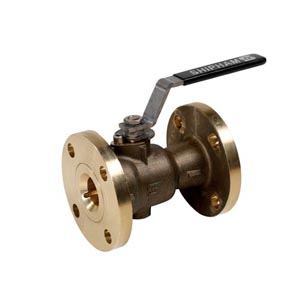
Seawater Ball Valves
A ball valve
is a valve that opens and closes by turning a handle attached to a ball
inside the valve (usually one quarter turn). The ball has a hole, through
the middle so that when the hole is in line with both ends of the valve,
flow of liquid will occur. When the valve
is closed, the hole is closed, and the flow of the liquid (Seawater) is
blocked.
Ball valves are reliable and usually achieve perfect shutoff even
after years of disuse. They are an excellent choice for applications
that require total shutoff. there are two basic designs of ball valves Ball,
floating ball and truuion trunnion mounted.
Floating Ball
types rely on the valve seats supporting the ball (made from PTFE
although hard seated variants are available). floating ball valves
are ideal for reduced pressure and low tempreture applications.
A trunnion ball
valve has a mechanical means of anchoring the ball at the top and the bottom,
this design is usually applied on larger and higher pressure valves (above
600 psi). Hard seated trunnion valves can be used for throttling applications.
Ball valves come in a range of types from, one,two and three piece construction,to full or standard port( hole) configuration.
Full Port (hole) ball valve has an oversized ball so that the hole in the ball is the same size as the pipeline resulting in lower friction loss. Flow is unrestricted, but the valve is larger in size.
A standard port seawater ball
valve is usually less expensive, but has a smaller ball and
a correspondingly smaller port. Flow through this valve is one pipe size
smaller than the valve's pipe size resulting in slightly restricted flow.
In reduced port ball valves, flow through the valve is one pipe sizes smaller
than the valve's pipe size resulting in restricted flow.
Manually operated ball valves can be closed quickly presenting a danger
of water hammer. ball valves can be equipped with an actuator that may be
pneumatically or electronically controlled.
Nickel aluminium bronze ball valves competes successfully on cost linked with corrosion properties giving a far greater life span of the valve making NAB an ideal choice for seawater solutions.
